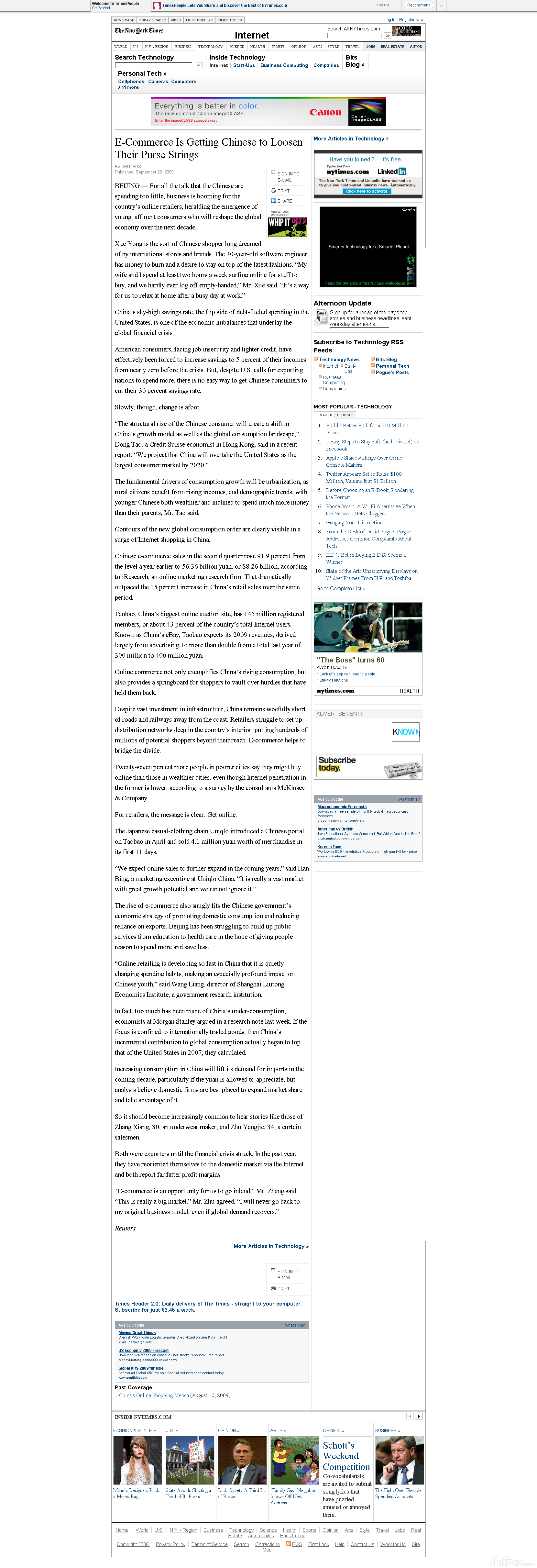|
|
E-Commerce Is Getting Chinese to Loosen Their Purse Strings
By REUTERS Published: September 23, 2009
http://www.nytimes.com/2009/09/24/technology/internet/24online.html?_r=2
BEIJING — For all the talk that the Chinese are spending too little, business is booming for the country’s online retailers, heralding the emergence of young, affluent consumers who will reshape the global economy over the next decade.
Xue Yong is the sort of Chinese shopper long dreamed of by international stores and brands. The 30-year-old software engineer has money to burn and a desire to stay on top of the latest fashions. “My wife and I spend at least two hours a week surfing online for stuff to buy, and we hardly ever log off empty-handed,” Mr. Xue said. “It’s a way for us to relax at home after a busy day at work.”
China’s sky-high savings rate, the flip side of debt-fueled spending in the United States, is one of the economic imbalances that underlay the global financial crisis.
American consumers, facing job insecurity and tighter credit, have effectively been forced to increase savings to 5 percent of their incomes from nearly zero before the crisis. But, despite U.S. calls for exporting nations to spend more, there is no easy way to get Chinese consumers to cut their 30 percent savings rate.
Slowly, though, change is afoot.
“The structural rise of the Chinese consumer will create a shift in China’s growth model as well as the global consumption landscape,” Dong Tao, a Credit Suisse economist in Hong Kong, said in a recent report. “We project that China will overtake the United States as the largest consumer market by 2020.”
The fundamental drivers of consumption growth will be urbanization, as rural citizens benefit from rising incomes, and demographic trends, with younger Chinese both wealthier and inclined to spend much more money than their parents, Mr. Tao said.
Contours of the new global consumption order are clearly visible in a surge of Internet shopping in China.
Chinese e-commerce sales in the second quarter rose 91.9 percent from the level a year earlier to 56.36 billion yuan, or $8.26 billion, according to iResearch, an online marketing research firm. That dramatically outpaced the 15 percent increase in China’s retail sales over the same period.
Taobao, China’s biggest online auction site, has 145 million registered members, or about 43 percent of the country’s total Internet users. Known as China’s eBay, Taobao expects its 2009 revenues, derived largely from advertising, to more than double from a total last year of 300 million to 400 million yuan.
Online commerce not only exemplifies China’s rising consumption, but also provides a springboard for shoppers to vault over hurdles that have held them back.
Despite vast investment in infrastructure, China remains woefully short of roads and railways away from the coast. Retailers struggle to set up distribution networks deep in the country’s interior, putting hundreds of millions of potential shoppers beyond their reach. E-commerce helps to bridge the divide.
Twenty-seven percent more people in poorer cities say they might buy online than those in wealthier cities, even though Internet penetration in the former is lower, according to a survey by the consultants McKinsey & Company.
For retailers, the message is clear: Get online.
The Japanese casual-clothing chain Uniqlo introduced a Chinese portal on Taobao in April and sold 4.1 million yuan worth of merchandise in its first 11 days.
“We expect online sales to further expand in the coming years,” said Han Bing, a marketing executive at Uniqlo China. “It is really a vast market with great growth potential and we cannot ignore it.”
The rise of e-commerce also snugly fits the Chinese government’s economic strategy of promoting domestic consumption and reducing reliance on exports. Beijing has been struggling to build up public services from education to health care in the hope of giving people reason to spend more and save less.
“Online retailing is developing so fast in China that it is quietly changing spending habits, making an especially profound impact on Chinese youth,” said Wang Liang, director of Shanghai Liutong Economics Institute, a government research institution.
In fact, too much has been made of China’s under-consumption, economists at Morgan Stanley argued in a research note last week. If the focus is confined to internationally traded goods, then China’s incremental contribution to global consumption actually began to top that of the United States in 2007, they calculated.
Increasing consumption in China will lift its demand for imports in the coming decade, particularly if the yuan is allowed to appreciate, but analysts believe domestic firms are best placed to expand market share and take advantage of it.
So it should become increasingly common to hear stories like those of Zhang Xiang, 30, an underwear maker, and Zhu Yangjie, 34, a curtain salesmen.
Both were exporters until the financial crisis struck. In the past year, they have reoriented themselves to the domestic market via the Internet and both report far fatter profit margins.
“E-commerce is an opportunity for us to go inland,” Mr. Zhang said. “This is really a big market.” Mr. Zhu agreed. “I will never go back to my original business model, even if global demand recovers.”
Reuters

|
Chinese, Getting, Loosen, Purse, Strings, Chinese, Getting, Loosen, Purse, Strings, Chinese, Getting, Loosen, Purse, Strings
评分
-
1
查看全部评分
-
|